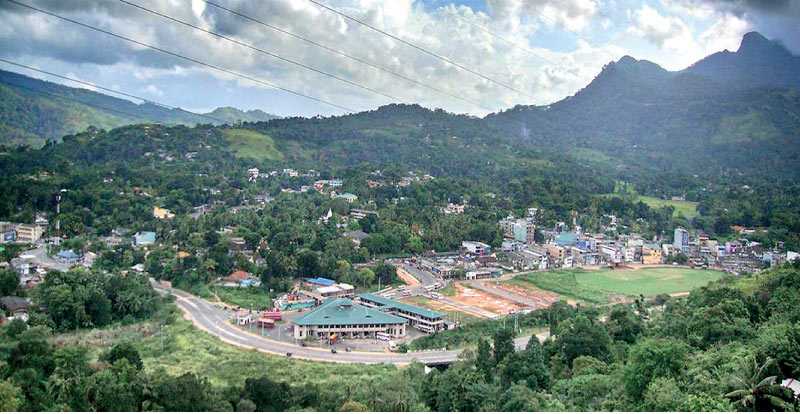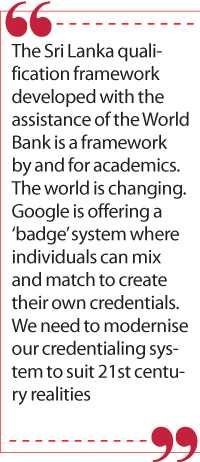Wednesday Feb 18, 2026
Wednesday Feb 18, 2026
Friday, 16 October 2020 00:20 - - {{hitsCtrl.values.hits}}

In 2015, Balangoda UC won the Asian Townscape Award by UN Habitat as one of the top 10 disaster resilient cities. Urban authorities from other countries in Asia visited Balangoda. Language was not an issue. Visitors and hosts were joined by genuine interest in Local Government. The tale of Balangoda is a tale of what cities could achieve if the long arm of the centre and its patronage politics can be kept away
The 20th Amendment is to be debated in Parliament on 20 October20th. In response to submissions by nearly 40 individuals and organisations as to whether the amendment has extra-constitutional provisions which need a referendum, the Supreme Court gave a yes and no answer. 
At the end of the day, the judges can do only so much. Changing the Constitution is a political matter and we must get it sorted through our representatives in Parliament. But who will vote with a conscience and who will vote for money?
While high stakes negotiations and discourses are happening on the 20A, I had a chance to be a speaker at a launch of a book by the name ‘Balangoda – A City that Won the World,’ authored by Nimal Prematilake who served as a Public Health Inspector in the Local Government system for decades with most of that time spent at the Balangoda Urban Council (UC). It was an interesting opportunity to reflect on topics like why we have provisions for decentralisation of power, rule of law and provisions for meritocracy in our Constitution, using a down-to-earth context.
I have known Prematilake since 2008, when I received a grant from the International Development Research Centre (IDRC) of Canada to explore innovations and knowledge networks for development. IDRC gave me the freedom to select a sector and three years to explore the sector with the guidance of a program officer. We thought we might choose tourism as the subject sector, but tourism was almost shut down due to the global financial crisis of 2007-2008. We finally settled on waste management where production continues in good times or bad. With its fame as an innovation centre for waste management, Balangoda Urban Council was our first stop and the beginning of my acquaintance of Prematilake, the PHI there.
The book is not just about Balangoda or Prematilake. The book really captures several facets of our government, public administration, and our society in its simple narrative running to a little over 100 pages. I like to pick three facets: Decentralisation of power, rule of law, and meritocracy.
Decentralisation of power
The present Constitutional debate is about centralisation of power, not just in Central Government but in one individual, the President. According to the principle of subsidiarity, Local Government should be the centre of the universe for an ordinary citizen. Subsidiarity is the principle that the more efficient and effective way to handle public affairs is to delegate them to the lowest or the least centralised competent authority.
Responsibility of course begins at the individual or family level. What the family or the community cannot handle we should ask the closest level of Government, i.e. Local Government, to do. In theory, Local Government could handle many things for us including the supply or electricity, water, policing, schooling, and even higher education.
In practice, the concept of Local Government is like vocational training. Everybody says nice things about it, but nobody wants to do it themselves or empower the concept. For the politically ambitious, Local Government is just a stepping-stone for higher office. Nobody sees Local Government office itself as a profession, but I do. In fact, there was a time when I fancied myself as mayor of a small town, like a character form a book I read as a schoolgirl.
At the time of my interactions with the Balangoda UC, Nimal Gamini Weerasinghe was the Mayor. He was a self-made man who rose from being a small-time vendor to a successful businessman. He came into Local Government through the 40% quota for youth under 35. He would have never made it to the Council otherwise.
When I first walked in the Balangoda UC office, the counters for citizen transaction was right in front, and the Mayor’s office was on the left such that the Mayor could see if a ratepayer has to wait too long to get the job done. The mayor was sharp enough to note Prematileke as a doer. Together they did many things that one would not have imagined possible for a small urban council to achieve.
What many people don’t realise is that the Urban Council Act, especially the Municipal Council Act, gives executive powers to mayors for independent initiatives. The waste management initiative at Balangoda was admired locally and internationally. In 2015, Balangoda UC won the Asian Townscape Award by UN Habitat as one of the top 10 disaster resilient cities. Urban authorities from other countries in Asia visited Balangoda. Language was not an issue. Visitors and hosts were joined by genuine interest in Local Government.
The tale of Balangoda is a tale of what cities could achieve if the long arm of the centre and its patronage politics can be kept away.
Rule of law
Today there is this alarming notion that we want leaders to get the job done going above and beyond the law, if necessary. The law is seen the obstacle to progress. Find the right leader, give him free reign. That seems to be the thinking.
Nothing is further from the truth because we are all only too human. No one person can solve all the problems with integrity. Administrative and Financial Regulations (AR/FR) or checks and balances are there for that reason.
Travails of Prematilake as he negotiates through the bureaucracy to get things done is almost comic. Although the Mayor, the PHI, and the team managed to successfully compost the biodegradables, the non-biodegradable paper, plastics, polythene and other waste was a problem. To stop people from sending non-biodegradables to the garbage dump, the PHI convinced the Mayor to use prime real estate in the centre of the town as a buying centre for recyclables.
How would you do incentive pay to a worker and how can you maintain a separate account for an enterprise in a local council? It had a taken lot of going back and forth with auditors, but, finally, the auditors saw the value of the initiative and gave the Council some tools to handle the situation within AR/FR. Buying a bobcat machine to turn the compost piles was another incident. Receiving a donation of a fire truck turned out to be a nightmare.
Nowhere in his book does Prematilake blame the system and rules therein. Though not expressly stated, the problem is people without imagination, passion, or simply the commitment to do one’s job. Corruption is another problem. Leaders can lead by example to break the grid lock of inaction or corruption in Government. Education is the long-term solution.
 Constitutional Council for Meritocracy
Constitutional Council for Meritocracy
Respect for education and the educated is well and good but meritocracy does not mean blind faith in qualifications. In that regard, the recent trend to put professionals into political or bureaucratic office is disturbing. The individuals who have come to the fore through this new fascination have excelled in their own fields, I am sure. However, that does not mean they are suitable for public office, political or administrative.
As the former Minister and Mr. Patali Champika Ranawaka argued eloquently in a recent video, public service in politics or public administration is a completely different game. It is a myth to think of successful military men or businessman transforming Government. Except in a few exceptional cases, you need people with a track record in Government to do the job.
The idealisation of professionals is based on the value our society places on educational credentials. For example, the CMC has large number of engineers heading their departments. They will not allow non-engineers to rise to these senior technical positions. It does not matter if the appointees do not perform in their jobs, they continue reign. The CMC engineers have been collecting garbage and piling them in whatever location – Bloemendhal, Meethotamulla and now Kerwelapitiya adjacent to Muthurajawela reserve – but they continue hold key positions.
I saw meritocracy in action when Minister Patali Champika sought out Nimal Prematilake and brought him with great difficulty to the ministry as a social specialist for waste management. Unofficially Prematilake handled the 200 or so metric tons of biodegradable waste coming into Kerawelapitiya from CMC every day.
Besides his proven expertise in waste management he has an impressive record of co-supervising master’s students, consulting foreign entities, etc., but how does one give recognition for such achievements to somebody holding only a PHI diploma? I am sure the Minister had to jump through many hoops to hire Prematilake as a senior official in waste management in Central Government, when there would have been engineers and other individuals with better credentials eyeing the job.
For high offices we have the Constitutional Council of the Parliament as a body that reviews and approves appointments. If a President wants to make a non-conventional appointment, he only has to make a case to the CC explaining why the person is suitable for the job. Taking away the powers of the Constitutional Council would be a blow to meritocracy.
How can we ensure meritocracy of the right kind, when we do other types of appointments which are not high posts?
Inclusive qualification framework
The IDRC allowed us to address the problem of recognising waste management talent which is not captured in typical paper credentials, by helping us develop a national vocational qualification (NVQ) for solid waste workers and relabelling their vocation as municipal solid waste operations assistant. The process starts with a skill standard where you specify for each level in a vocation the things that a person should know and can do.
With the skill standard in place, a training institute can develop a curriculum and get accredited to award a related credential. If an experienced worker wishes to demonstrate his knowledge and skills, there is a Recognition of Prior Learning (RPL) process where he/she can take a trade test or test to demonstrate knowledge and skills.
Vocational qualifications can go only so far. Even if you have a NVQ at the highest level, our culture is such that somebody with parallel academic qualifications might end up supervising an NVQ qualified person. In that respect, it is important to give the NVQ holders the ability to obtain a charter in the professions. The Chartered Waste Manager qualification by the Chartered Institute of Waste Management in UK is one such avenue.
At the end of the day we do need paper credentials, but an inclusive qualifications framework allows people with talent to get in midway and get recognised for their talent. The current education system bifurcates youth as those who aced the GCE A/L and went on to a coveted profession like medicine and those who did not. But success in an examination is only about success at taking exams and nothing else.
The Sri Lanka qualification framework developed with the assistance of the World Bank is a framework by and for academics. The world is changing. Google is offering a ‘badge’ system where individuals can mix and match to create their own credentials. We need to modernise our credentialing system to suit 21st century realities.